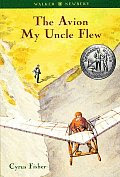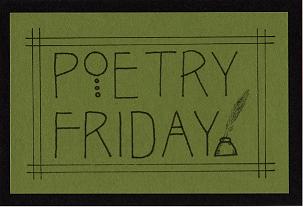 I wish my copy of this book weren't packed and somewhere heading across the Atlantic. The artwork on the 1960's version is full of larger-than-life stereotypes -- a cartoony biplane, a sinister looking man with a big nose and a baguette, and a kid with boots.
I wish my copy of this book weren't packed and somewhere heading across the Atlantic. The artwork on the 1960's version is full of larger-than-life stereotypes -- a cartoony biplane, a sinister looking man with a big nose and a baguette, and a kid with boots.My first copy of this book I borrowed from my best friend when I was eleven. My best friend at the time was a twenty-seven year old policeman's wife who was pregnant with her first child, and who apparently was testing her tolerance for children by having around. We are still dear friends, so I know she was at least somewhat amused with me, but she was my best friend then solely because she had books, and let me read them. She'd invite me to sit down amongst the piles and shelves in her cool den, and, with clean hands and promises not to turn back the pages, let me read anything child-friendly that she had, as long as I was in her home.
I have to admit, I seriously considered stealing this book from Auntie Nita. I wanted to read this book over and over again, because the story hooked me from the very start.
Johnny's Dad has been away, fighting in WWII, and Johnny's mother, who is French, has been doing her best to keep up with the ranch in Wyoming without him -- but it's not going so well. There isn't money for the things Johnny wants, like a two-wheeler red bicycle with a high gear and a low gear like his friend Bob's. Johnny really wants that bike, and during a bad winter storm, he does his best to be a man on the ranch and help out -- because he knows that if they get the work done, and the money coming in, maybe they can afford more things. When 12-year-old Johnny fractures his leg trying to help bring in the cattle from the east range, things go from bad to worse. Johnny's break is set multiple times in the next year and a half, but the fact is, he may need an operation. It'll be expensive, tricky, and painful. Now Johnny's leg has been set more than once, and the doctors say he'll need an expensive, painful and tricky operation but without it, the doctor says he will never walk again.
Johnny's not only terrified, but he's angry once his father finally comes home, and breaks the news that he isn't able to stay, and Johnny's going to get dumped in a little village in France with his mother's brother to regain his strength. Who wants to go to some dumb little village where nobody speaks English? Not Johnny, that's for sure. He wants to be with his ranch and his cattle and his father, and he's not taking it well that he isn't getting his way.
There are some pluses he notices once his awe-inspiring tantrum is over. For one thing, Oncle Paul is building an airplane... l'avion. For another thing, Johnny -- or Jean -- has been promised an awesome red bicycle at the end of the summer, if he will make an attempt to walk again.
But there's more. Jean learns that something is downright fishy in the little French village. There are strange people about -- stranger than just the regular old strange French people in the village. And then Jean finds un pistolet... dans une baguette de pain... a gun in a loaf of bread. Soon readers are on the trail de l'aventure... et, oui: they are reading in French.
Quite possibly no other middle grade novel ever ends in this fashion; the last three chapters of The Avion My Uncle Flew are written completely in simple French. Readers will surprise themselves when they find that they can read it!
First published in 1946, immediately following World War II, this book earned a Newbery Honor citation for 1947, and has since been kind of a forgotten classic, but readers will be pleased to know that it was re-released in April of 2004 by Walker & Company.

The Avion My Uncle Flew was written by Cyrus Fisher, the pen name for author Darwin LeOra Teilhet (1904-1964). As a child, Teilhet traveled frequently to France, his family’s ancestral land, and even worked as a juggler in a French circus. Having learned to fly in high school, Darwin Teilhet returned to St. Chamant in 1924 to build a glider. Teilhet served as an intelligence officer in Great Britain and the United States during World War II, and from there got plenty of fodder for this post-war YA adventure novel.
Darwin Teilhet and his wife, Hildergarde Tolman Teilhet wrote more than fifty detective novels during the Golden Age of Mysteries, when the likes of Agatha Christie, Dorothy Sayers and Ellery Queen were in high demand. Darwin Teilhet taught journalism classes at Stanford and worked as consultant for various film producers. As executive assistant to the President of Dole Pineapple in Hawaii -- what sounds like a relatively staid, 'normal' job, produced for him even more ideas for murder mysteries. One of his most famous is set in Hawaii, and references Dole. Since YA literature wasn't then what it is now, Teilhet only wrote two novels for young people using the pen name of Cyrus Fisher -- two that I could find, anyway. I am hoping that somewhere, someone knows of a few more.
Read the first chapter of this suspenseful and entertaining bilingual mystery. You'll want to take this gem and keep it, too.
It's been an amazing week! I've really enjoyed seeing what book treasures out there I might have missed, and hope you have too! Last recommendations unearthed today at:
 A Chair, A Fireplace & A Tea Cozy - The impactive, gritty Vietnam books by Ellen Emerson White,
A Chair, A Fireplace & A Tea Cozy - The impactive, gritty Vietnam books by Ellen Emerson White,Big A, little a goes down to The Deep by Helen Dunmore,
Bildungsroman discusses the May Bird Trilogy by Jodi Lynn Anderson, whose other work I've enjoyed, so I know I'll need to check this out,
Not Your Mother's Bookclub takes a look at some recently revised classics,
Fuse Number 8 takes on Stoneflight by George McHarque
At lectitansit's books, Louisiana Styles, with Gentle's Holler and Louisiana Song both by Kerry Madden, a great bppl and a book review I will be posting soon,
Our able leader at Chasing Ray finishes the week with Kipling's Choice by Geert Spillebeen,
Interactive Reader chimes in with a fun sounding book I'm sure I need to read, A Plague of Sorcerers by Mary Frances Zambreno,
The YA YA YAs discuss the spooky sounding Resurrection Men by TK Welsh, whose good with the creepier stories,
Seven Impossible Things Before Breakfast finishes out the week sitting pretty with Such a Pretty Face: Short Stories About Beauty edited by Ann Angel





 When I originally mentioned UK author Maggie Prince's first US-published novel,
When I originally mentioned UK author Maggie Prince's first US-published novel, 
















 cool-sounding places like Knocklofty Park and a town called Dynnyme. (Den Me? Denny Me? How does one say that aloud?) Hobart is home to beaches, and bridges, and boats and a really cool
cool-sounding places like Knocklofty Park and a town called Dynnyme. (Den Me? Denny Me? How does one say that aloud?) Hobart is home to beaches, and bridges, and boats and a really cool  Eglantine's Cake is a blog full of musings on the everyday, with thoughtful talk on the writing life ("...if a novel was a daily account, a diary, it would be pages and pages of 'nothing to report'. When we look back on our lives we probably see it in this way, episodes of note and in between an aggregate memory of undistinguished days: dinners, breakfasts, showers, sleep."), sprinkles of cuteness from
Eglantine's Cake is a blog full of musings on the everyday, with thoughtful talk on the writing life ("...if a novel was a daily account, a diary, it would be pages and pages of 'nothing to report'. When we look back on our lives we probably see it in this way, episodes of note and in between an aggregate memory of undistinguished days: dinners, breakfasts, showers, sleep."), sprinkles of cuteness from  and dramatic, with a blue eye staring out balefully over a stormy sea. Please note the exceptionally placed lightning bolt.
and dramatic, with a blue eye staring out balefully over a stormy sea. Please note the exceptionally placed lightning bolt. charm is that she is ...dead ordinary. Really. She fights with her Mom, and thinks she's just a bit weirder than other moms. She had a little brother who sometimes refuses to wear pants. She has a best friend who's heart she breaks by falling for his brother, and she's stubborn yet at times so bewildered by her sudden maturity that she's hilarious. So the lightning? It's there, but it's not so much a part of that Ordinary Life, at least not in the first book in the series. The Australian cover, with the layers of depth beneath water seems to suit the story best.
charm is that she is ...dead ordinary. Really. She fights with her Mom, and thinks she's just a bit weirder than other moms. She had a little brother who sometimes refuses to wear pants. She has a best friend who's heart she breaks by falling for his brother, and she's stubborn yet at times so bewildered by her sudden maturity that she's hilarious. So the lightning? It's there, but it's not so much a part of that Ordinary Life, at least not in the first book in the series. The Australian cover, with the layers of depth beneath water seems to suit the story best.

